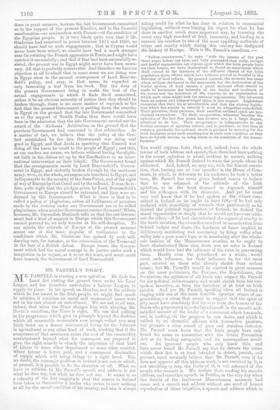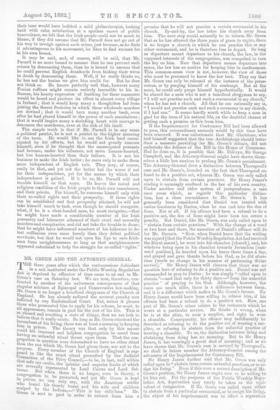MR. PARNELL'S POLICY. , M R. PARNELL is starting a new agitation.
He finds the Land Act cutting the ground from under his Land League, and has therefore undertaken a Labour League, to supply its place. In his speech on Monday, and in the address which he has issued to the Irish people, we might find much to criticise, if Criticism on social and economical issues were not in his case almost an anti-climax. We are not at all sure, indeed, that when the Times charges him with abetting Mr. Davitt's socialism, the Times is right. We can find nothing in his programme which goes in principle beyond the doctrine which all reasonable economists now accept,—that you may fairly insist on a decent minimum of living for the labourer in agricultural or any other kind of work, trusting that if the acceptance of that minimum raises the cost of the commodity manufactured beyond what the consumers are prepared to give, the right remedy is clearly the migration of that kind of labour to some other department or some other country, where labour is better paid, and a consequent diminution of supply which will bring things to a right level. But, no doubt, the economic problem in Ireland is not one on which, at present, it is possible to fix the attention at all. What we have to criticise in Mr. Parnell's speech and address is not what he does say, but what he does not say. It seems to us a calamity of the first magnitude that the masses in Ireland have taken to themselves a leader who seems to care nothing at all for the moral condition of his country, and who is always
taking credit for what lie has done in relation to economical legislation, without ever hinting his regret for what he has done in another much more important way, by lowering the never very high standard of Irish humanity, and lending in a manner his sanction to one of the most appalling outbursts of crime and cruelty which during this century has disfigured the history of Europe. This is Mr. Parnell's exordium ;—
"Fellow.countrymen,” he says, "with the lessons of the past three years before our eyes, and fully persuaded that unity, energy,, and lawful organisation are objects upon which the Irish people have set their hearts, we have determined to found an association which shall extend to the interests of the different classes of the Irish. population those efforts which have hitherto proved so fruitful in the direction of land reform. By general consent, the moment has come. when, without detriment to the movement for the destruction of thu feudal system of land tenure, a great national effort should be made to harmonise the interests of the trades and workmen of the towns and the labourers of the country in an organisation to which eaoh class might look for national regeneration. The labourers have an urgent and acknowledged claim in this respect. Legislators, recognise that their lot is unendurable, and that the clumsy legisla-. thou which has sought to remedy it must be altogether remodelled. Their privation, their patience, their unselfish national spirit are pro- claimed everywhere. To their co-operation, whatever benefits the, agitation of the last few years has secured are, in a large degree,. admitted to be due. Their co-operation is indispensable to any further measure of agrarian reform, and in prudence, no less than in common gratitude, the national credit is pledged to securing for the Irish labourers some such amelioration in their own condition as they have so loyally striven to bring about in the condition of the tenant- farmers."
You would suppose from that, and, indeed, from the whole tenour of both address and speech, that there had been nothing in the recent agitation to avoid, nothing to correct, nothing: against which Mr. Parnell desired to warn the people whom he addressed. And, indeed, we may say, with the firmest convic- tion, that, barring one or two speeches in the House of Com- mons, in which, in deference to his audience, he took a better tone, Mr. Parnell has never given Ireland reason to believa that he was ashamed of the attitude of the Irish, agitation, or in the least disposed to reproach himself and his colleagues with its character, And yet he must very well know that if he had spoken of the crimes com- mitted in Ireland as he ought to have felt,—if he had only declared with something of warmth that passionately as he desired the political regeneration of Ireland, he desired thu moral regeneration so deeply that he would not have one with- out the other,—if he had characterised the organised cruelty to.
the brute creation, the cowardice involved in assassination from behind hedges and doors, the hardness of heart implied in deliberately mutilating and murdering by firing volley after volley into a poor man's legs, or in murdeting after the whole- sale fashion of the Maamtrassna murder, as he ought to. have characterised these sins, there was no voice in Ireland which would have had the influence of his voice in preventing them. Hardly even the priesthood, as a whole, would exert such influence, for their influence is, for the most part, exerted on those who already shrink from serious. crime ; but Mr. Parnell's would be exerted in great measure on the mere politicians, the Fenians, the Republicans, the Secularists, the agitators of all kinds who respect Mr. Parnell for his political achievements, and would shrink from his out- spoken invective, as from the invective of at least an Irish patriot. And yet Mr. Parnell, speaking when all Ireland is. ringing with one of the most horrible agrarian crimes of our generation,—a crime that seems to suggest that the spirit of pity must have absolutely fled for ever from the breasts of the fiends who perpetrated it,—declares himself in the smooth self- satisfied manner of the leader of a movement which has made,. and is making, all the progress he can desire, and which is sullied by no shameful alliance with destructive passions, but presents a clear record of pure and stainless victories. Mr. Parnell must know that the Irish people have only heard his name in connection with the Grime Prevention Act as its leading antagonist, and its unscrupulous assail-. ant. An ignorant people who only know this, and have never heard Mr. Parnell say that he detests the crime which that Act is at least intended to detect, .punish, and prevent, must naturally believe that Mr. Parnell, even if he does not approve all this hideous work, is not revolted by it, is not unwilling to reap the fruits of it, is not ashamed of the people who commit it. We declare that, reading his smooth address, and smoother speech, in Dublin, on the very day when the details of the loathsome Maamtrassna massacre had conic out, a speech and address without one word of honest reprobation of those iniquities, a speech and address which in their tone would have befitted a mild philanthropist, looking back with calm satisfaction at a spotless career of public benevolence, we felt that the Irish people could not be much to blame, if they did assume that Mr. Parnell does not go out of his way to inveigh against such crime, just because, as he finds it advantageous to his movement, he likes to find excuses for in his own breast.
It may be said, and, of course, will be said, that Mr. Parnell is no more bound to assume that he can prevent such crimes by denouncing them, than he is bound to assume that he could prevent English drunkards from kicking their wives to death by denouncing them. Well, if he really thinks so, he has not the brains we give him credit for. But he does not think so. He knows perfectly well that, however many Fenian ruffians might remain entirely insensible to his in- fluence, his hearty expression of loathing for these massacres would be heard and produce its effect in almost every village in Ireland ; that it would keep many a thoughtless lad from joining the Secret Societies in which these wholesale murders are devised ; that it would turn many another back, even after he had placed himself in the power of such associations ; that it would inspire many a shrinking heart with courage to denounce the murderers, even at the risk of life itself.
The simple truth is that if Mr. Parnell is in any sense
a political patriot, he is not a patriot in the higher meaning of the term. He would like to see the Irish land eman- cipated by his efforts, but he would not greatly concern himself, even if he thought that the emancipated peasants had become, under his influence, not more human-hearted, but less human-hearted than their fathers. It is not his business to make the Irish better ; he cares only to make them more independent of English rule. They may, of course, easily be that, and yet not the better but the worse if not for their independence, yet for the means by which their independence is gained. If it be so, Mr. Parnell will not trouble himself on that score. He leaves the moral and religious ondition of the Irish people to their own consciences, and their priests. For himself, he concerns himself only with their so-called rights and their prosperity. If those rights can be established and that prosperity attained, he will not take himself much to task, even though he should recognise, what, if he is a clear-headed man, he must recognise,—that he might have made a considerable number of the Irish peasantry and labourers ashamed of their cruel and cowardly murders and conspiracies, and did not take the trouble to do so ; that he might have influenced numbers of his followers to de- test ruffianism even more keenly than they detest political servitude, but that he would not open his lips to save Irish- men from unrighteousness, so long as that unrighteousness appeared calculated to help the struggle for so-called "rights."































 Previous page
Previous page